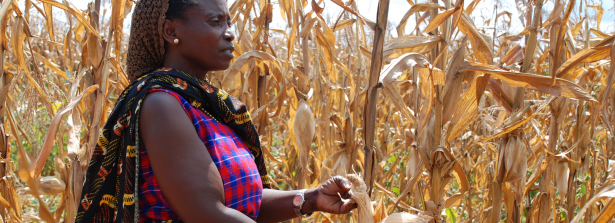Promoting stress-tolerant varieties at scale – Kenya

Duration: April 1, 2019 – March 31, 2022
Project information
Full title: Promoting stress-tolerant varieties at scale: Interlinking the private seed sector and insurance advisory services in Kenya
Objective: This project aims to investigate how different types of market actors in high-quality seed systems can promote their clients’ adaptive capacity by interlinking stress-tolerant varieties with innovative financial and advisory services that help resolve key barriers to adoption, targeting particularly female farmers and youths in Kenya.
Abstract: Smallholder farmers require innovative solutions to mitigate the consequences of increasing climatic risks. This project investigates how different types of market actors in high-quality seed systems can promote their clients’ adaptive capacity by interlinking stress-tolerant varieties with innovative financial and advisory services designed to resolve key barriers to seed adoption, targeting particularly female farmers and youths. Specifically, the project proposes testing the impacts of bundling seeds with innovative crop insurance and advisory services that provide comprehensive yet affordable risk management solutions.
The research team will facilitate – through knowledge sharing, capacity building and research uptake activities – the scaling of these services. The research team hypothesizes that bundling seeds with such services helps improve effectiveness and trust in seed quality, while also minimizing the (often perceived) risks around adopting such seed varieties—thereby potentially unlocking further agricultural investments.
In the first two years, the project will test these hypotheses by means of a randomized trial in which different types of seed market actors promote a stress-tolerant seed variety either in isolation (control) or bundled with a high-quality comprehensive insurance product versus a personalized remote advisory service.
The team will analyse whether impacts differ depending on the type of seed provider offering these services, comparing the cost-effectiveness for an incumbent seed company, a smaller private seed company, and a national agricultural research centre, with potentially more inclusive distribution channels to reach women and the youth.
The project will build on findings from past seed systems interventions in Kenya, including the DTMA project and ACRE’s Replanting Guarantee scheme, and will leverage existing initiatives including KALRO’s Digital Hub for Agriculture, to facilitate a nationwide scale-up of key findings and lessons learnt with the different types of seed providers in the third year.
_ _ _
This project received funds in the Call on “Seed Systems Development (SSD): Enabling and Scaling Genetic Improvement and Propagation Materials” which was released by NWO-WOTRO within the framework of the Netherlands-CGIAR research partnership. The nine awarded project consortia consist of Dutch research institutes, CGIAR Research Programs or platforms, and (Dutch or local) partners from the public and private sector.
